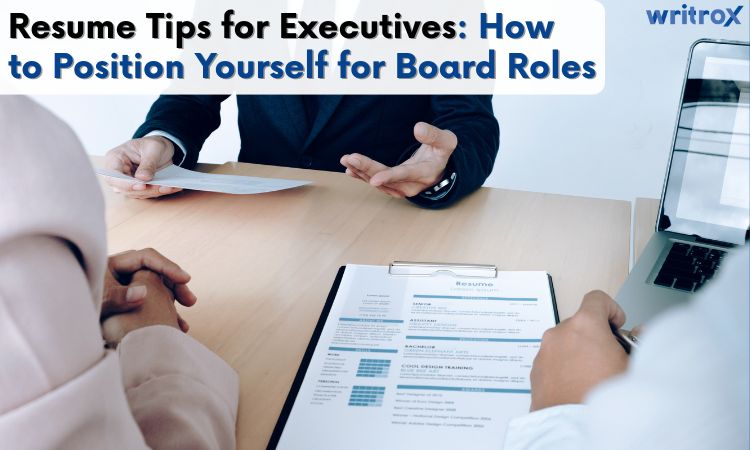To be a board member is a very big step for any executive. It is not merely a designation; it is shaping the future of a company. You must know that board roles deal primarily with the art of big-picture decision-making, financial planning, and risk management. Daily operations? That is not your job anymore. So you might need to tweak your resume to accommodate the same. If you’re aiming for such roles, consider following some resume tips for executives to better reflect your strategic value and leadership potential.
It is tough for most executives to structure their resumes for these roles. Does your resume paint a picture of your strategic vision? Does it prove your adeptness in dealing with very complicated issues?
Don’t worry! This blog will be a guide to taking each minute step and discuss the need of resume writing services. We shall work with you to develop a board-worthy resume that stands out. Let’s get going on your journey to the boardroom!
What Makes a Board Resume Different?
What makes a board resume distinct from an executive resume? It is about the skills and qualities sought by board recruiters. These recruiters are after leaders that are excellent in governance, finance, and risk management.
Here, your daily operational experience is important but not the focal point. Boards want to see strategic vision and the ability to lead an organization through challenges.
A board resume needs to be clean, concise, and impactful while showing accomplishments that directly translate into the board’s success.
Let’s begin to reinvent your resume and learn some resume tips for executives. The next few sections will give you the outline for a great board-ready resume.
Changing Your Resume from Executive to Board Level

All right, so here is the thing. How to convert an executive resume into a resume for the board level?
First, realize that board roles are different from executive roles. While an executive manages the daily to-dos in an organization, a board deals with things relative to the longer-term perspective, defining company policy, financial oversight, and so on.
They want strategic thinkers who will help the organization plan its future. Your resume should show this. You could demonstrate accomplishments relating to governance, risk management, and financial acumen.
Show how you have brought long-term success rather than just keeping the wheels turning on day-to-day responsibilities. Ready to make that change? Let’s look at how to write and position those elements in your resume!
Also Read: Executive Resume Writing Trends in 2025
Making Your Resume Suitable for Board Opportunities
What is the basic requirement that needs to be modified in your executive resume so as to aid the search of board recruiters? Let me tell you, it all comes down to focus. Board recruiters will always judge governance, decision-making, and financial management skills first.
The emphasis will lie upon the governance of your organization and being accountable for financial oversight. Your executive resume must address your expertise in risk management and strategic planning.
Use unambiguous and simple language which denotes board-level expertise. You must elaborate on your contribution to long-term sustainability in the context of complex challenges.
Writing a Strong Board Resume Summary
Here is the best board resume executive summary example. It must contain the following plus further things:
- Don’t stop describing your experience in governance,
- Competencies in financial decision-making,
- Company regulation, and
- Risk management.
It should be short and very much to the point. 3-4 short sentences that convey board-level worth could do. Write to impress but also to establish authority.
Research the company you’re applying to, so you may know their specific requirements. Knowing their needs would help you pitch your utility better.
Highlighting Your Governance and Advisory Experience

You might already have some board related experience that you are unaware of. Having experience in advisory positions, committee work, or nonprofit board work can be assets to their resume.
A decent knowledge on corporate policies or regulations and financial reviews can only add to your argument.
Below are some example bullet points that might find their way into your resume:
- “Assisted the Audit Committee in all financial reviews and compliance-related activities.”
- “Provided advice to the executive team on strategic initiatives that contributed to a 20% revenue increase.”
- “Chaired a nonprofit board, leading governance and engaging the wider community.”
These points do a perfect job of presenting your case for a board position!
Using Numbers to Show Your Impact
You can include numbers to demonstrate all your successes in the board to make your case stronger against other competitors. Board recruiters might prioritize the gains you have managed to secure for the company. Your achievements are the best way to show your impact and strategic thinking.
You may say, “Managed financial planning for an Rs 8,300 crore company, yielding 15% lesser costs,” instead of saying, “Led financial planning”.
Some more instances:
- “Direct oversight of risk management strategies has revealed potentials losses worth ₹500 crore being prevented.”
- “Formulated a company’s infrastructural policies that improved the rate of compliance by 30%.”
- “Mentored a strategic initiative that has taken market share higher by 25% within 2 years.”
Such metrics clearly go to show a board how valuable you are! This is among the most important resume writing tips for executives.
Structuring Your Resume for Board Positions
An organized board resume should ideally span about two pages. Use a normal, clean layout. The intention is to be clear and professional without using over-the-top features or unnecessary details.
Here are the important sections you need to include in the board resume:
- Board Summary & Key Skills: A brief summary of your experience in governance and its skill sets.
- Board & Advisory Experience: Show relevant positions with contributions.
- Major Governance & Strategic Achievements: Present quantifiable successes in governance.
- Professional Background Brief: Summarize your career with an emphasis on board-relevant roles.
- Education, Certifications & Board Training: Relevant qualifications and training and board-specific programs improve credibility.
That’s how to justify qualifications for a board position nicely!
Final Touches to Strengthen Your Resume
Strengthening your board-worth resume, you must focus on strategy, finance, and company policies. You may take professional help and seek resume writing tips for executives. Important points would include the following:
- Shift Focus: Prioritize governance instead of management. Lay emphasis on your expertise in decision-making, risk management, and financial planning.
- Mention Advisory Roles: Include advisory and not-for-profit board service, as both are advantageous for board-level positions.
- Use Numbers: Compile achievements into numbers that give evidence of results and impact.
- Maintain Clarity: Keep the resume short, crisp, and formal, preferably up to two pages long.
Adhering to these principles will give you a niche-to-desire resume that shows off your talents with respect to board opportunities!
Conclusion:
Put plainly, firms want to add board members with financial training, governance experience, and people who are natural strategic thinkers. An impeccable board resume can tilt the odds considerably in favor.
Are you ready to step up? Start working on that resume right away if you want to land a board position in the near future!
For those who feel they need an expert to help in advertising their talents, seek out Writrox’s executive resume writing services. Take care and see you on board boss!













